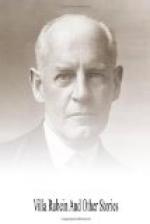bars, looking on a courtyard. Long policemen’s
coats and caps were hanging from some pegs. The
Inspector told me to take off my cap. I took
it off, wig and all. He asked me who I was, but
I refused to answer. Just then there was a loud
sound of voices in the room we had come from.
The Inspector told the policeman to look after me,
and went to see what it was. I could hear him
talking. He called out: ‘Come here,
Becker!’ I stood very quiet, and Becker went
towards the door. I heard the Inspector say:
’Go and find Schwartz, I will see after this
fellow.’ The policeman went, and the Inspector
stood with his back to me in the half-open door, and
began again to talk to the man in the other room.
Once or twice he looked round at me, but I stood
quiet all the time. They began to disagree, and
their voices got angry. The Inspector moved a
little into the other room. ‘Now!’
I thought, and slipped off my cloak. I hooked
off a policeman’s coat and cap, and put them
on. My heart beat till I felt sick. I
went on tiptoe to the window. There was no one
outside, but at the entrance a man was holding some
horses. I opened the window a little and held
my breath. I heard the Inspector say: ’I
will report you for impertinence!’ and slipped
through the window. The coat came down nearly
to my heels, and the cap over my eyes. I walked
up to the man with the horses, and said: ‘Good-evening.’
One of the horses had begun to kick, and he only
grunted at me. I got into a passing tram; it
was five minutes to the West Bahnhof; I got out there.
There was a train starting; they were shouting ‘Einsteigen!’
I ran. The collector tried to stop me.
I shouted: ‘Business—important!’
He let me by. I jumped into a carriage.
The train started.”
He paused, and Christian heaved a sigh.
Harz went on, twisting a twig of ivy in his hands:
“There was another man in the carriage reading
a paper. Presently I said to him, ’Where
do we stop first?’ ‘St. Polten.’
Then I knew it was the Munich express—St.
Polten, Amstetten, Linz, and Salzburg—four
stops before the frontier. The man put down
his paper and looked at me; he had a big fair moustache
and rather shabby clothes. His looking at me
disturbed me, for I thought every minute he would
say: ‘You’re no policeman!’
And suddenly it came into my mind that if they looked
for me in this train, it would be as a policeman!—they
would know, of course, at the station that a policeman
had run past at the last minute. I wanted to get
rid of the coat and cap, but the man was there, and
I didn’t like to move out of the carriage for
other people to notice. So I sat on. We
came to St. Polten at last. The man in my carriage
took his bag, got out, and left his paper on the seat.
We started again; I breathed at last, and as soon as
I could took the cap and coat and threw them out into
the darkness. I thought: ’I shall
get across the frontier now.’ I took my




